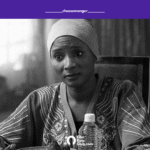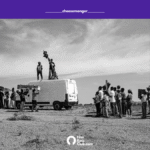- Film like any other art form has functions other than entertainment. Over the years, film has become a powerful vehicle for culture, education, leisure, propaganda and has served therapeutic purposes.
Film plays important roles in the development of any groups of people, ethnicity, and race as a nation or country. It is a veritable tool of national development. One of the key areas in which it performs this duty is in the realm of culture. Culture is the totality of the ways of life of a group of people or nation including their food, costumes, dressing, music, marriage and burial practices etc, and it is the bedrock of the essence of being of a people. Film is a purveyor of culture.
And this is what the film “Lionheart” does. By portraying the Nigerian culture vividly in the film, Lionheart makes bold statements about the Nigerian people.
Lionheart captures the challenges and travails of a female in a male-dominated industry. It tells the story of Adaeze who steps into her father’s shoes when health issues force him to take a step back from his company.
The use of the Nigerian Languages, Igbo and Hausa in the film serves as a reminder that these languages should be preserved as it is through a language you can get to know and get involved with the culture.
We also see a deliberateness in the costuming in Lionheart, we see characters wearing Nigerian attires and the women wearing Nigerian Hairstyles as opposed to straight hair weavons and wigs. Our clothing indicates who we are as individuals in any society.
The beautiful shots of Enugu brings her alive, presenting to the world the beauty and aesthetics of the Coal City and Nigeria at large.
Lionheart does more than depict the Nigerian culture in its contribution to national development. Before the opening credits roll, Nnaji’s character is introduced trying to manage a group of touts protesting at the premises of Lionheart (the eponymous transport company) for some money they’re entitled to for simply being touts. If we forgive the awkwardness of that scene (who plays diplomacy with a group of touts in pristine English?), we’d see that the intentions of that scene goes far beyond introducing Adaeze as efficient and competent. Many may have missed this, but there’s a clip at the end of the film, after the end credits have rolled (credit cookie) where we see some of the touts from the opening scene manning Lionheart’s gate as gatemen and security guards. The film’s message is, that for vices such as thuggery to be curbed, there’s a dire need for the youths of Nigeria to be empowered and employed.
However Lionheart’s biggest contribution to national development comes with exploring ethnicism as a theme in the film. Ethnicism is arguably the bedrock of many of Nigeria’s problems and woes and I admire the thoughtfulness in making it one of the film’s subthemes. When Adaeze and Uncle Godswill propose a merger between Lionheart and Maikano in a bid to save the Lionheart company from bankruptcy to Chief Ernest, he expresses his reservations “Ndi Hausa?”. As simple as this expression is, it exposed his doubts in having business dealings with a Hausa man for the simple reason of him being from another ethnic group. The paradox is found in the scene where Ernest and Maikano meet and he reveals in fluent Hausa that he was actually born and raised in the north. This is where they find confluence and thus, their prejudice and distrusts are tossed out of the window.
The portrayal of Igbo and Hausa culture in the contemporary Nigerian setting does not only preach unity in diversity, it also redefined stereotypes of the Igbo as money-loving and Hausa-hating. What this movie tries to say is that there are bad eggs or rotten apples be it Igbo, Hausa or Yoruba.
Lionheart draws a conclusion that only when we set our differences aside and find unity amidst our diversity can we progress and move forward not only as individuals but in a larger sense as a country
Contributor: Dika Ofoma is a graduate of History and International Studies. He is a _nollyphile_ and is interested in film discussions. He also produces a show on radio and writes short fiction sometimes.








38 thoughts on “FILM AND NATIONAL DEVELOPMENT IN NNAJI’S “LIONHEART” by Dika Ofoma”
Pingback: dapoxetine combined with tadalafil
Pingback: albuterol sulfate inhalation solution 2.5mg
Pingback: hydroxychloroquine fda approval
Pingback: hydroxychloroquine human consumption
Pingback: hydroxychloroquine coronavirus trial results
Pingback: hydroxychloroquine vs remdesivir cost
Pingback: ivermectil for humans
Pingback: generic priligy uk
Pingback: antiparasitic tablet uses
Pingback: teva 3109 for plasmodium
Isotretinoin Isotretin Best Website
Pingback: canadian pharmacies for prednisone
Pingback: stromectol with ibuprofen
Pingback: stromectol bubble gum
Pingback: what parasites does ivermectin kill in humans
Pingback: ivermectin for humans walmart
Pingback: indications for stromectol
Pingback: ivermectin tablets for head lice
Pingback: ivermectin at tractor supply
What’s up, this weekend is nice in favor of me, for the reason that this moment i am reading this wonderful informative post here at my residence. http://herreramedical.org/cialis
Pingback: low price cialis
always i used to read smaller articles or reviews that as well clear
their motive, and that is also happening with this paragraph which I am reading
here. http://harmonyhomesltd.com/Ivermectinum-side-effects.html
Pingback: cost of clomiphene for men
Pingback: 1 ivermectin
Pingback: ivermectin corona covid
Pingback: ivermectin for lice in humans
Pingback: 100g viagra
Pingback: over counter viagra
Pingback: canadian pharmacy cialis
Pingback: sildenafil without a rx
Pingback: canadian pharmaceutical companies
Pingback: how to get cialis prescription online
Pingback: hydroxychloroquine for sale in mexico
Pingback: soolantra for sale online mexico
Pingback: where can you buy viagra over the counter in canada
Pingback: generic tadalafil for sale
Pingback: can you buy viagra over the counter uk
Provoked thought and taught me something new, as if my brain needed more exercise.